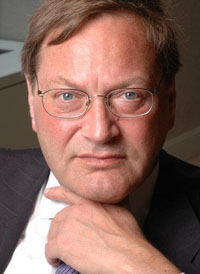Sad news for CC Agostino von Hassell

Agostino von Hassell
All: I was advised last night of the death of Agostino von Hassell’s mother. I have attached the obituary. For those of you who do not know Agostino (Omar), he is one of the USMCCCA’s most staunch supporters and benefactors and the driving force behind the re-write of Last to Know, First To Go. A celebration of the lives of his Mother and Brother who died several weeks ago are being held at the New York Athletic Club later today. I know he would appreciate hearing from his friends. His email address is: AVonhassel@aol.com.
–Jack Paxton
(The Obituary for his mother is published below)
Obituary
ART EXPERT & CRITIC CHRISTA VON HASSELL
New Yorker Christa von Hassell (née von Studnitz), a descendant of Prussian military nobility, died on August 15, 2009. She was one of the last ‘grand dames’ of a world that straddled different eras, from a Prussia long gone to the present metropolitan glamour of New York City. Her second son, Adrian von Hassell, had died only five weeks earlier on July 6, 2009.
Ms. von Hassell was the widow of Wolf Ulrich von Hassell, one of the first two Ambassadors of the Federal Republic of Germany to serve at the United Nations and a member of the German resistance against Hitler during World War II.
Ms. von Hassell moved to New York City in 1972. Upon her husband’s retirement in 1978, she assumed an active role as a reporter in New York City’s art market. An art expert and critic, she was a long-time fixture at Christie’s and Sotheby auctions, where she covered their sales for Germany’s Weltkunst Magazine as well as for Die Welt.
Dr. Hugo Weihe, International Director Asian Art at Christie’s said: “Christa was uniquely passioned and interested in matters of art and the artworld. She was inspired to discover new areas such as Buddhist sculpture from India and Tibet, and was generous in offering her insights based on years of closely following the auction scene in New York. Her observations were invaluable. I cherish the memory of her disciplined approach and passionate feeling for art and the people around it.”
Christa von Hassell was born in 1923 in Muttrin, Pomerania to Erika von Studnitz, née von Zitzewitz and Lieutenant General Bogislav August Wilhelm von Studnitz. The Zitzewitz family’s estates in Pomerania numbered more than 25 and employed over 20,000 agricultural workers.
She grew up close to several military bases and lived with her father for several years before World War II while he served as German military attaché at the German Embassy in Poland before World War II. During the war she studied art history in Prague.
Her father, Lieutenant General Bogislav August Wilhelm von Studnitz, was killed on the orders of Hitler on January 13, 1943, days after her brother Lieutenant Hans-Melchior von Studnitz had been killed on the Ukrainian front. Her first husband, Egloff von Tippelskirch served in the German Army on the eastern front. He was captured by the Russian army and died in February 1946 in a prisoner of war camp.
During the Soviet occupation of East Germany Ms. von Hassell and her mother lived in Altenburg in Thuringia. She worked in an ammunition factory. When faced with the possibility of being sent to work in the mines, she managed to “promote” herself to teach English to Saxon school children in Altenburg. During this period, she repeatedly crossed the border from the Russian zone to the west at night in order to escort children of friends to the west. Eventually Ms. von Hassell convinced the Soviets that she needed to improve her English and was allowed to travel on a temporary basis to London. She flew out from Berlin on an empty coal plane that had delivered coal to Berlin, then under blockade by the Soviets. She would not return to Altenburg.
After living in England for a year, she managed to establish residence in Bonn. At this time, she advised her mother to seek a way to leave Altenburg. Meanwhile, her mother’s family estates in Pomerania had been seized and had become Soviet and Polish properties. Her mother, Erika von Studnitz, in an incredible feat of command presence, convinced a Soviet Commissar to give her two railroad cars to move her remaining effects from occupied East Germany to Bonn.
In Bonn where the new Federal Republic of Germany was formed, Ms. von Hassell joined the protocol office of the Foreign Office of “Auswärtiges Amt.” The first formal state dinners of Chancellor Konrad Adenauer were decorated with elaborate silver candelabra brought west by her mother. The young government, then still contending with a state of post-war scarcity, was delighted by the loan.
In Bonn Ms. von Hassell met and married Wolf Ulrich von Hassell, a member of the diplomatic service. His father, Ulrich von Hassell, was a prominent member of the German resistance during World War II; he was executed after the July 20, 1944 attempt on Hitler.
The couple lived in Rome, Brussels, and Bonn before moving to New York. During her years in New York and in the official capacity of an Ambassador’s wife, Ms. von Hassell frequently hosted numerous dinners and receptions at the family’s apartment on Park Avenue. Based on a detailed diary that recorded seating charts, menus, and table decorations, she once estimated that she entertained in five years over 3,500 people.
She is survived by a son, Christian Augustin (Agostino) of New York City, a daughter, Malve von Hassell of Southampton, and three grandsons. (Her late son, Adrian, died on July 6 at New York Hospital Cornell Weill of complications related to his treatment for leukemia.)
A memorial service for Christa and Adrian von Hassell will take place on Saturday, September 19, 2009 from 5 p.m. at the New York Athletic Club at 180 Central Park South in New York City. RSVP’s are requested and may be made at 212-252-2090 or memorial@thereptongroup.com.